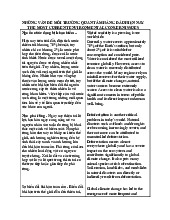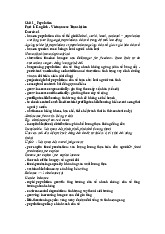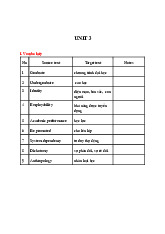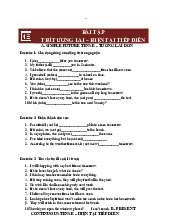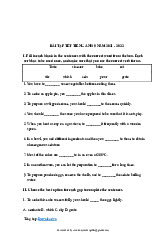



Preview text:
lOMoAR cPSD| 47882337 lOMoAR cPSD| 47882337
Tom and Hanry are twin brothers. Tom had set his sights on(1) going
to university, but some of his teachers told him his grades were not
up to scratch(2). So he decided to work harder, burning the candle
at both ends(3) and studying long hours. As a result, his work
improved in leaps and bounds(4) and he got a place at university.
Harry, on the other hand, was naturally clever. When he was younger, all his teachers thought
he was on track(5) for a place at university. In his last couple of years at school, however, he
started getting poor grades and had a lot of ground to make up(6) in order to improve. Unlike
his brother, though, he didn’t work round the clock(7), and as a result he didn’t get in to university.
1. set someone’s sights on = decided to achieve something: đặt mục tiêu
2. up to scratch = up to a satisfactory standard or quality: đạt tiêu chuẩn
3. the candle at both ends = going to bed late and getting up early: thức khuya dậy sớm
4. in leaps and bounds = progressing rapidly: tiến bộ nhanh chóng
5. on track = working on and likely to achieve something: có khả năng thành công
6. a lot of ground to make up = a lot of work to catch up: cố gắng bắt kịp
7. round the clock = all the time: suốt ngày đêm
How do you learn and remember new vocabulary in English? Here are some tips from other students:
Kasia: I usually try to learn new expressions off by heart(1), espicially when they don’t exist in my language.
Sadiq: I’ve got a memory like a sieve(2), so I find a mind map or drawing can help. If I have a few
key words or an image, it jogs my memory(3).
Massimo: Because I like acting in my spare time, I often learn certain things like I would learn a
script, so I can repeat the word for word(4). Stuff like irregular verbs, for example.
Downloaded by June Lee (lenhungkttm@gmail.com) lOMoAR cPSD| 47882337
Farah: At school, we were always taught to learn by rote(5), so that we could repeat things from
memory, and I still use that technique to help me remember new vocabulary.
Ana: I’ve got a terrible memory. Most things just go in one ear and out the other(6), so I always
try to make a mental image when I learn new words. Often it’s something funny. I find that
helps the words stick in my mind(7) better.
1. learn something off by heart = learn something so that you can remember it perfectly: ghi nhớ thật tốt
2. a memory like a sieve = a bad memory: trí nhớ kém
3. jog one’s memory = helps to remember/ remind: giúp ghi nhớ
4. word for word = using exactly the same words: dùng từ chính xác
5. learn by rote = learn something to be able to repeat it exactly (even if you do not understand it):
6. go in one ear and out the other = are forgotten immediately: quên ngay lập tức
7. stick in one’s mind = be easily remembered: dễ dàng ghi nhớ Example Definition Meaning
I've been doing this job for 20 years, but
It's difficult to make someone khó làm ai đó thay đổi
now they're bringing in new software which change their way of doing things,
I'm finding difficult to use. You can't teach
especially if they have been doing an old dog new tricks. it for a long time.
You're teaching your grandmother to suck
You are giving advice to someone đưa ra lời khuyên cho
eggs! I've been fishing here for years, so I
about something they know more 1 người có kinh
think I know where the best places are. about than you nghiệm hơn
I stayed up all night the night before the to learn from a negative rút kinh nghiệm từ lỗi
exam, but was so tired the next day I did
experience not to do something sai
really badly. I've learnt my lesson and won't again be doing that again.
The next time he arrives late, just go
to show someone as a result of
dạy cho ai đó 1 bài học
without him - that will teach him a lesson experience what not to do Correct the mistakes. 1.
Alain was always eating sweet things, but after the dentist gave him several fillings, I
think he's studied his lesson.
Downloaded by June Lee (lenhungkttm@gmail.com) lOMoAR cPSD| 47882337 2.
Florence seems to be burning the candle at both sides at the moment - going to parties
every night and then getting up early to study. 3.
Dev started telling the IT manager how to set up a spreadsheet. Talk about teaching your grandmother to eat eggs! 4.
I keep forgetting that I can use online banking to pay my bills. You can't teach an old bird new tricks, I suppose. 5.
Frida has set her eyes on becoming CEO, and after her latest promotion, she's well on the way. 6.
After his rude behaviour, Oli's mother decided to learn him a lesson and didn't let him
play with his friends.
Match the beginning of each sentence with its ending. Correct the mistakes in these idioms. 1
I'm absolutely exhausted at the a. track to graduate in the moment. summer. I've been working round b. for word today. I was very 2
Since she started at her new school, impressed!
Tanya's work has come on in leaps c. the clock to finish my essay 3
I handed in my essay, but my tutor gave on time.
it back and said it wasn't up to d.
scratch. I have to rewrite it. 4
Michael's working hard at university and is on e. heart for a test tomorrow. 5
I taught the children a new song f. and bounds.
yesterday and they repeated it back to me word
6 Our chemistry teacher told us we had to learn
part of the periodic table off by
Read these statements and answer the questions.
Imogen: I draw pictures in my notebook so that when I see the picture, I remember the word.
Ralf: I can still repeat all the poems I memorised as a child.
Meredith: I'm determined to get top marks in my next test!
Rajesh: I've tried to explain to my grandad how to use a smartphone, but he just doesn't get it.
Hailey: I read through all my notes last night, and now I can't remember anything! Tom:
I was ill for three weeks at the beginning of term, and so I need to catch up on my homework.
1. Who learnt things by rote?
2. Who can't teach an old dog new tricks?
3. Who needs something to jog their memory?
4. Who has a memory like a sieve?
5. Who has a lot of ground to make up?
6. Who has set their sights on achieving a high grade?
Downloaded by June Lee (lenhungkttm@gmail.com) lOMoAR cPSD| 47882337
Downloaded by June Lee (lenhungkttm@gmail.com)
